Braced for cuts in Wales's poorest county
- Published
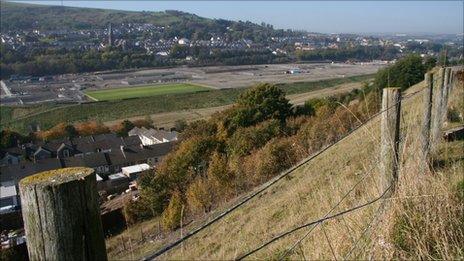
The cleared land from the steelworks at Ebbw Vale will be redeveloped with public money
The UK Government will next week detail the savings it is looking to make in the public sector, but what will cuts to services mean to people who rely on them day to day?
Blaenau Gwent is Wales's smallest and most deprived county; three industrial and urban seams running north to south, between steep valley walls, 30 miles (48km) north of Cardiff.
The towns of Tredegar, Ebbw Vale and Blaina were once industrial powerhouses, while nearby villages drew families and businesses on the strength of mines running the length of the valleys.
But the decline of heavy industry has left behind problems that no amount of landscaping can disguise.
The county has the highest unemployment claimant count, the lowest household earnings and the highest crime rate in Wales.
In a recent study of resilient areas in Wales, Blaenau Gwent was named the most vulnerable county to public sector cuts.
But you don't need statistics to tell you that; it is written in the number of boarded up shops and homes across the county.
And it is most clearly evident in the vast scar of empty land next to Ebbw Vale, once the site of the biggest steelworks in Europe but mothballed in 2002 and demolished three years later.
More than two million tonnes of materials have been excavated from the 200-acre site to clear it, and £200m is promised in the form of redevelopment.
A new 96-bed hospital opened on the site earlier this week, and there are plans for new homes, a school, green spaces and leisure facilities but many are worried that public spending cuts to be announced next week in the Spending Review will hit the area, and the proposals, hard.
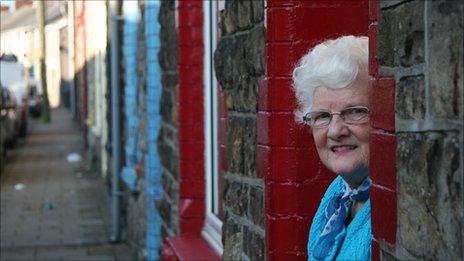
Hilda Barwell has lived in Ebbw Vale for 79 years
"We seem to be returning to the days of the 1930s," says 80-year-old Hilda Barwell, who has spent all but 12 months of her life in Ebbw Vale.
A committed volunteer, her terraced home is filled with awards and letters praising her for charity work, and neighbours often tap on her window asking her for advice on filling in forms and dealing with council paperwork.
She says: "The birth of the NHS and social services meant people could live without fear. But the fear is returning.
"People are frightened to death, and are worried what cuts will mean to their heating allowance, and to their pensions."
Two miles down the road from the steelworks site is Cwm, a small, former mining village. Along one stretch of road, boarded up are the butchers, three grocery shops, the 'Central Garage', chapel and care home.

Nicola Williams started an autism support group
Two generations ago the main street provided homes for more than 2,000 miners, but these days it only gets busy when local mothers push their children home in prams after school.
Nicola Williams and her family have lived in the village for four generations; her great-grandfather, grandfather and father all worked in the mine until it was closed by Margaret Thatcher's government in 1989. Mrs Thatcher's name is still spoken through gritted teeth in the area.
Nicola helped set up an autism support group with friends, when the local authority could not provide the help she needed for her nine-year-old son Dylan, whom she calls her "inspiration".
Her husband works for the local authority as a refuse collector and as a family she says they are scared what public spending cuts will mean to the area.
"As a county, we haven't got anything to start with. If there are any cuts it will be devastating," she says.
"This is a deprived area, a poor area. We can't afford to lose jobs."
She adds: "Services are being cut down and cut back. Last week refuse collection went fortnightly, and we don't see street cleaners here very often.
"It's so frightening. We are holding on at the moment but I'm worried about the impact on my family, and whether charities will also be hit.
"There's going to be a greater burden on the charity sector. But it's so stretched now and if funding is taken away, I dread to think what is going to happen."
From nationalised industries to the NHS, founded by Tredegar-born MP Aneurin Bevan, who held the seat of Ebbw Vale in parliament, people in Blaenau Gwent have relied upon government, local and central, for generations.
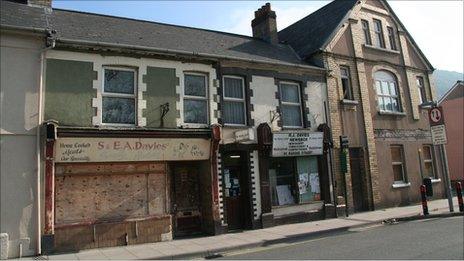
The village of Cwm has suffered since the closure of the colliery in 1989
Today, almost every part of life in the county is still affected by government spending - the bypass road to Ebbw Vale was created with Welsh Assembly Government money, as was the new hospital named after the NHS founder, and the train service to Cardiff.
Across the Gwent valleys, a network of Community Info Shops funded by the assembly provide a drop-in service for job listings, financial and housing advice, language lessons, training and even fresh fruit and vegetables thanks to local co-operatives.
In Cwm, 61-year-old George Piff and his wife Anne live opposite one such shop, and hold a spare key to let people in out-of-hours.
He and his wife moved to the area from the Midlands in 2003. Told he was too old to find work, he threw himself into community life and volunteer work.
His porch is filled with rolled up black bags for locals to pick up when walking their dogs to clear up the mess.
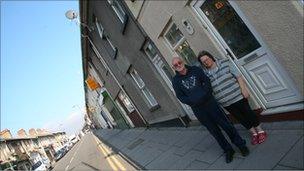
George and Ann Piff moved to Wales in 2003
Struggling to raise money for a Christmas pantomime, George helped the village organise a fundraising "copper mile".
Cwm residents put pennies and two pence pieces outside their homes in a line which stretched from one end of Marine Street to the other - raising more than £600 in the process.
Unable to claim his state pension for another four years, he relies on pension credits, which also give him heating allowances, free dental service, and pay his council tax.
"We've got £189 a week to live on. It's very tight to manage on that," he said.
"The pension goes up once a year, but fuel prices go up all the time. If the heating allowance is cut, then we'll have a problem keeping the house warm.
"We were trapped inside the house for five days last winter."
Both George and Anne also take advantage of free prescriptions in Wales.
George says: "Everyone our age is on at least one tablet a day; Anne takes five tablets. If free prescriptions go, that's a lot of money coming out of our pension."
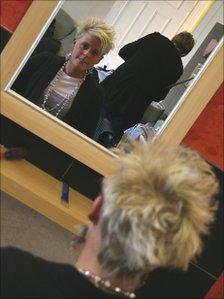
Rebecca Miller started her hair salon in 2000
Above Ebbw Vale, Rebecca's Hair Design has been serving the locals in Hilltop, the nearby estate for almost 10 years.
Rebecca Miller started the salon when she was 19 years old and has been helped with grants from the council to grow the business. During elections, she turns the salon into a polling booth, even if it means losing a day's business.
She's hoping for a further grant to improve the shop front, and to give the salon a new floor, but is beginning to think spending cuts will limit her chances.
She says she is worried what the effect of cuts will have on customers' spending.
"We've had an up and down year and if people have less in their pockets, it's going to hit me hard," she says.
Everyone seems fearful of what the spending review will bring, but they are also agreed on where cuts should be targeted - government waste.
"There are too many councillors, too many MPs," says Hilda.
"David Cameron needs to start looking in his own backyard before making cuts elsewhere. There's so much waste," says Nicola, referring to Top Shop boss Philip Green's report on government spending.
"We've had a good recycling system in the county - but it's changed five times. That to me is a tremendous waste of money," says George Piff.
The spending review is likely to affect every corner of the UK, but the near 70,000 residents of Blaenau Gwent are bracing themselves for further pain in an area that has already been suffering for a long time.
- Published12 October 2010
- Published12 October 2010
- Published12 October 2010